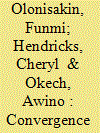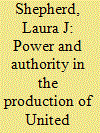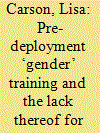| Srl | Item |
| 1 |
ID:
175776


|
|
|
|
|
| Summary/Abstract |
United Nations Security Council Resolution 1325 was full of promise, not just when it was first passed in October 2000 but for many years afterward. It brought hope to women peace activists for a variety of reasons — not least its recognition of the importance, and indeed the necessity, of actively involving women in peace processes. It stressed the need for women’s meaningful participation in negotiations along with the need for protecting, even prioritizing the rights of women affected by war or conflict.
|
|
|
|
|
|
|
|
|
|
|
|
|
|
|
|
| 2 |
ID:
142053


|
|
|
|
|
| Summary/Abstract |
This article explores the convergence between three pillars of influence – feminist security studies, civil society activism and policy decision-making – and its role in the adoption and implementation of United Nations Security Council Resolution (UNSCR) 1325. It argues that these three pillars, individually and collectively, have made important contributions to the debate and action on the gender and security agenda, but that they remain organically disconnected. Their convergence has the potential to achieve path-breaking results in the sphere of gender and security, whilst their divergence makes transformation unattainable. We show the disconnect in the application of UNSCR 1325 in Africa and argue that this is partly the reason why, despite enormous efforts, the gains realised in terms of gender equality in the peace and security arena have been negligible.
|
|
|
|
|
|
|
|
|
|
|
|
|
|
|
|
| 3 |
ID:
082469


|
|
|
|
|
| Publication |
2008.
|
| Summary/Abstract |
United Nations Security Council Resolution (UNSCR) 1325 was adopted in 2000 with the aim of ensuring all efforts toward peacebuilding and post-conflict reconstruction, as well as the conduct of armed conflict itself, would entail sensitivity toward gendered violence and gendered inequalities. In this article, I contrast two accounts of the writing of UNSCR 1325 that issue from the two institutions that claim authority over the document: the United Nations Security Council and the NGO Working Group on Women, Peace and Security. I make a broader theoretical argument about the importance of paying analytical attention to the discursive terrain of international institutions when analyzing the formulation and implementation of security policy, concluding that contemporary theorizing of international institutions is product/productive of a particular configuration of political authority and legitimacy that can, and should, be challenged
|
|
|
|
|
|
|
|
|
|
|
|
|
|
|
|
| 4 |
ID:
144321


|
|
|
|
|
| Summary/Abstract |
In the area of peacekeeping training, Australia has a reputation of promoting ‘best practice’ internationally. Training for Australian police peacekeepers has been described by the United Nations as ‘one-of-a-kind’ and ‘a world-class model of best practice’. This article provides a case study of how gender training is conducted, and how ‘gender’ is understood from a critical feminist perspective. This article focuses only on the pre-deployment training stage and is informed by confidential interviews with staff from the Australian Federal Police and the Australian Defence Force, as well as observing training in 2013–14. The findings suggest that the training is inadequate because it is not carried out for all peacekeeping personnel, despite international and national requirements to do so. In addition, the findings suggest that ‘gender’ is understood in a very limited way that does not problematise power relations between the sexes and is only covered as a way of understanding the peacekeeping context, and not in relation to the attitudes and behaviours of peacekeepers themselves. This raises the question of whether and how other troop-contributing countries conduct the training and to what standard, given the documented problems of Australia's supposedly ‘best-practice’ training.
|
|
|
|
|
|
|
|
|
|
|
|
|
|
|
|